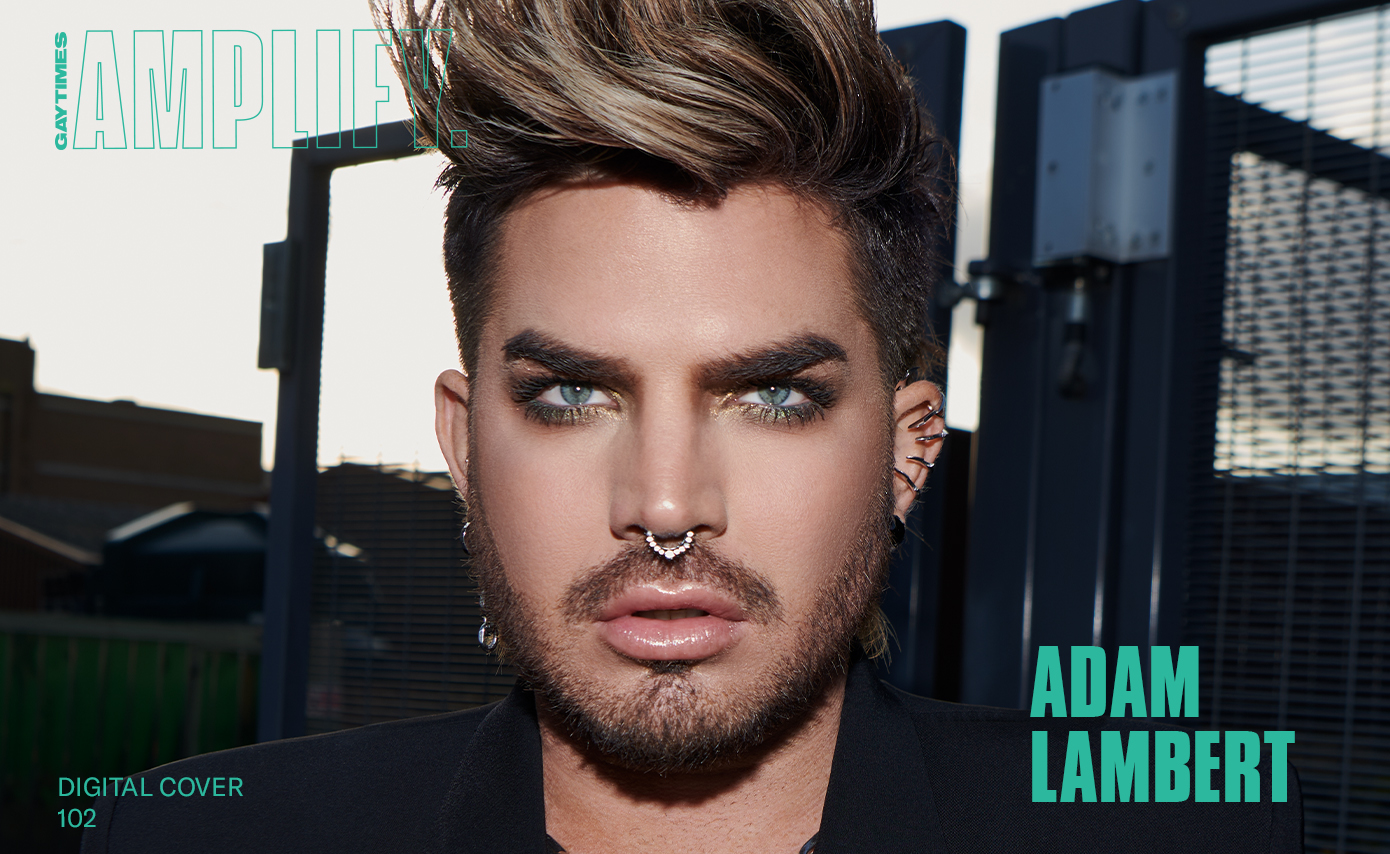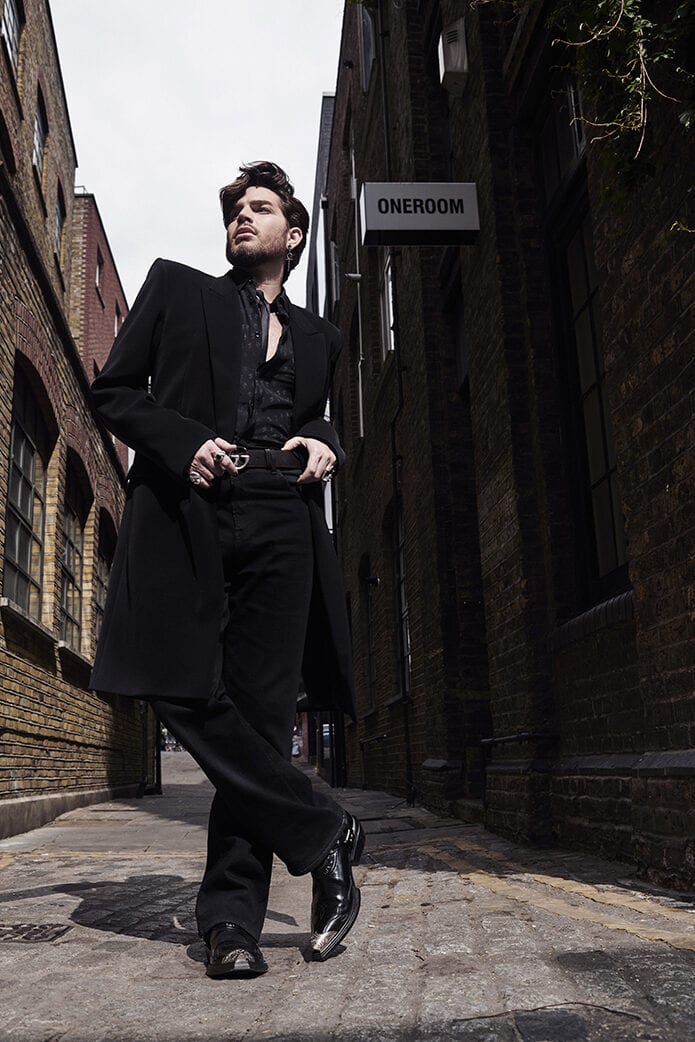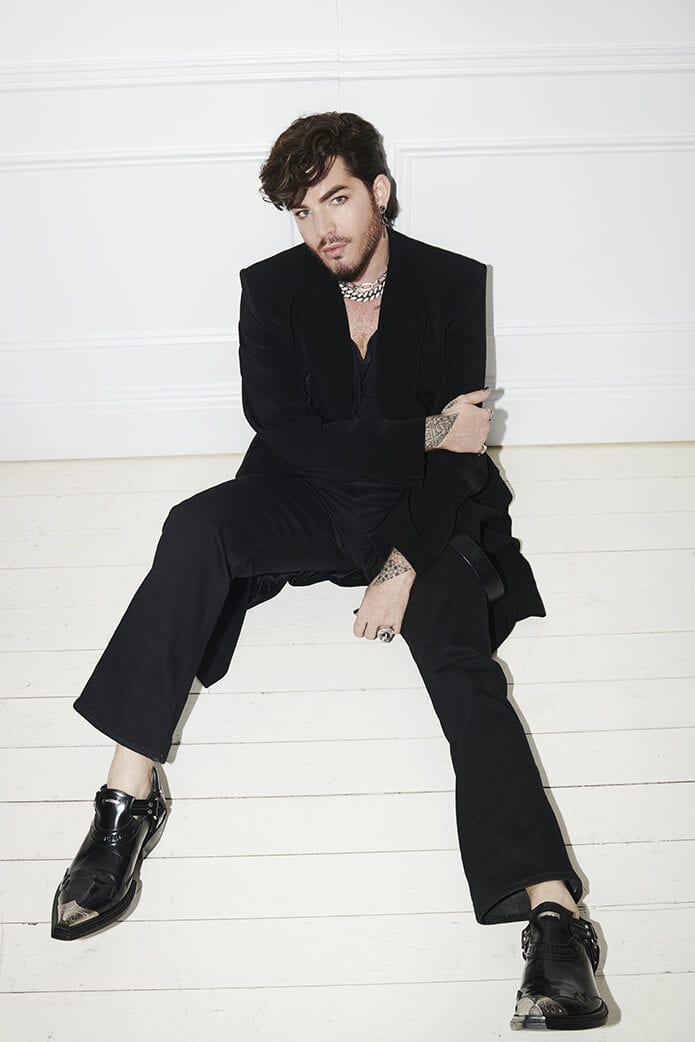
“I am so excited about what Lil Nas X did,” says Adam Lambert down the phone. “I just think it’s high time we had somebody out there being exactly who they are.” The American singer-songwriter is full of passion and praise for pop culture’s latest queer superstar, commending him for forging a successful and fruitful music career as an openly gay man.
It’s something Adam knows all too well. When he was catapulted to global fame following his memorable run on American Idol back in 2009, Adam had to navigate being unapologetically queer while cultivating a successful career that wouldn’t offend Middle America. More than 10 years on with millions of records sold, having toured the world, and fresh from launching his own philanthropic initiative to help LGBTQ+ people called the Feel Something Foundation, we’d say he’s done a decent job doing so.
While he faced a global pandemic-shaped bump in the road when releasing his fourth studio album Velvet last March, Adam didn’t let the cancelled tour plans get him down. Instead he launched himself into new creative projects, and reached out to other LGBTQ+ musicians to start a conversation about being a queer person in the music industry and the challenges that it brings. It led to his Feel Something Foundation partnering with Stonewall Day on 6 June, with Adam curating a very special line-up of musical performances as well as hosting the event.
We caught up with the star to speak about the importance of supporting LGBTQ+ issues, the explosion of queer talent we’ve seen break through in recent years, and why it’s imperative the community bands together to fight for and protect the rights of trans people.
How have you found the past year in lockdown?
Obviously the pandemic is terrifying and really tragic and it’s hurt people financially, the health ramifications of it all, and employment has been hit. But all that stuff aside, it has forced everyone to slow down a bit and reevaluate our priorities. At least that’s how I feel. I think there’s some silver lining in that. I feel like there are certain things I took for granted before that I won’t take for granted now.
Professionally for you, you released your fourth album Velvet just as we went into lockdown last March. How did you deal with that at the time?
It was a bit of a bummer! I had a lot of plans to promote the album and had a tour planned. Everything got shut down and I had to mourn the loss of the project. At the same time I realised that that was nowhere near as important as people’s health. I felt a little guilty even feeling bad about it because obviously it’s not important in the grand scheme of things. The shock of it took me a minute, but then I got over it and just decided to keep moving forward and keep being creative. So I started working on a new project.
Was that new music specifically?
I’m working on a musical. It had been in the works a little before the pandemic, but what I found with being at home was that I was able to really focus on it. I did a lot of writing sessions via Zoom with some amazing writers and producers. Being on Zoom isn’t quite as magical as being in the room with people, but we wrote some great songs. So the musical is well underway and I’m very excited about it. It’s something I’m not really ready to reveal exactly what it’s about yet, but at some point, sooner than later I’ll be able to talk about it.


You’ve also been kept busy this year curating Stonewall Day, and you will be on hosting duties for it. Can you give us an idea of what we can expect?
I have a foundation called the Feel Something Foundation, and we’ve been doing a handful of different projects this year. I’ve done collaborations with a number of charities over the years, but just felt like it was time to put together my own organisation. We’ve raised money, we’ve partnered with some amazing charities and support groups, and it’s all LGBTQ+ focused. I wanted to connect with other queer people in the music industry because I know that when I started 10 years ago, it was sort of like the Wild West for me. There weren’t a lot of us on the mainstream level. It was an obstacle course. I didn’t have that many examples of how to go about things, and it was quite an adventure. Ten years later I can see there’s been so much progress, and there’s so many more queer artists out there right now. We’re now allowed in that space. I just wanted to connect with other people, so about six months ago we did an online symposium where we got together and talked. It was a very diverse panel and we discussed what it was like being queer in the music space, queer issues themselves, intersectionality, the challenges we face in this industry, and our experiences with the business side of it. Most importantly we spoke about the fact that now there is a real community within the music industry, and it’s up to us to create and support each other in that community. The Feel Something Foundation wants to continue that conversation, so when it came to Stonewall Day we were very excited to partner with them and create a concert with some of the people that I spoke with. There are some upcoming artists and some more established ones, and I feel like there needs to be more opportunities like this for queer artists. We’re not just a token one in a line-up, but we can have an event where it is queer-focused and the token is one ally! Wouldn’t it be amazing to have an LGBTQ+ music festival? I feel like it’s only a matter of time.
That’s what any Pride line-up should be; it should be mainly LGBTQ+ artists.
Yeah, I’d like to see the majority of the line-up be queer. We all love our allies and that’s very important as well. I also think we’re at a tipping point now where you can ask yourself, ‘Are the allies taking part to be virtue signalling, or are they actually allies?’ I think it’s important to ask that. ‘Is this for publicity, or is this what they are really about?’ We have a lot of great allies in the space, so if they are truly an ally, c’mon and join us!
There has been an explosion of LGBTQ+ music talent in recent years…
There’s so much talent! And it’s a really diverse array of talent too – across genres, philosophies, it’s a really exciting time. But I also think it’s across the board in the entertainment industry. We’re seeing a lot more queer actors come through. It’s a time where we don’t have to ask permission anymore. It’s a time where queer creatives deserve some spotlight. I also feel that more and more we’re able to stand on our own two feet, and I think that’s really important to note. We don’t need the straight saviours to come in and save us! We’re good and we’re doing really well.
When you have an openly gay man like Lil Nas X fully embracing his sexuality in his music and visuals and it’s the biggest hit in the world, you know things are heading in the right direction.
I am so excited about what Lil Nas X did. I just think it’s high time we had somebody out there being exactly who they are. The thing I love about what he’s doing is not just to say the statistic of a queer person having this many streams and all that, but I also love the tone of what he’s doing. It’s finally challenging the double standards. We have straight artists creating this type of entertainment and we’ve grown accustomed to it over the past 25 years, but when it came to gay artists we had to tone it down, or make sure that it wasn’t too sexualised, or aggressive, and it had to be safe and easy to digest. What Lil Nas X is doing is being a rockstar about it. He’s being subversive and it’s great.
There was always an accepted level of gay and you couldn’t challenge ‘traditional values’ too much, so I love the fact Lil Nas X has torn that down.
He’s completely saying, ‘Take it or leave it.’ To me, what it was for the longest time was ‘I can identify as gay, but I can’t show it.’ Not on a mainstream level. What Lil Nas X is doing is, ‘I’m identifying, I’m showing it, I’m talking about it as honestly as I would with my friends at a club.’ I think it’s so good and so real.
And so unapologetic.
Yeah it’s rock and roll. I love it and I think he’s really revolutionary in that way. The thing that’s interesting is that there’s been a number of us who have tried it or wanted to do something along those lines, but the timing was wrong. People weren’t ready yet. The industry wasn’t ready, the public wasn’t ready, and I think that’s part of what’s so magical about what he’s doing; the timing is right and it’s the apex of society being ready to support this. There’s enough people willing to support it and like it, where it’s not going to be the kiss of death for his career. There’s a lot of us who have definitely pushed things. I did that at the beginning of my career and I got in big trouble for it.
The big example is when you kissed your guitarist on stage and it turned into this big thing. It was literally just a kiss!
Yeah! Timing is everything. Also, let’s be honest, he came off just having a number one with Old Town Road. It was a giant record, and in this industry if you have success, the door opens wider. You have more leeway. I’m really impressed that he’s playing it very well and he’s using it for good. I love that.
Back to Stonewall Day; its focus is raising awareness of LGBTQ+ issues and queer history. What was your journey towards learning about queer history and those who have come before us?
I’ve learned more and more over time. I’m kind of a history nerd! I love watching documentaries and historical films, so I think I’m kind of somewhere in between. In many ways, passing down our own history has been a bit foggy for many people because a lot of the community had to hide for so long. Things had to be secret. When you then think about the AIDS epidemic, that took away so many of our elders. So there was sort of a missing link there in terms of passing down wisdom and being an older sibling to the next generation coming up. I’ve been lucky enough to talk to queer people that existed before AIDS and lived to tell us about it. As a gay person, it’s really nice to seek it out and take the initiative to learn about it. What’s beautiful is that because there’s so much more queer media and entertainment, we’re getting a lot of these stories. Look at It’s A Sin. What a brilliant series that was. We’re also expanding the narrative. For the longest time what we saw in terms of queer representation in mainstream media was cliché. The gay person was the joke or the victim. Now I feel like we’re seeing three dimensional characters. In terms of Stonewall itself, the big eye-opener for a lot of us over the past decade or so is being reminded that this revolt was led by and started by queer, trans women of colour. With all the discussion about race and trans issues right now, it’s really important to note. The gay rights movement was started by Black trans women and Latinx trans women, and we need to celebrate that. These were monumental leaders and revolutionaries that we should hold to the highest esteem.
As we know there’s still so much more work to be done. In America alone there have been so many anti-trans bills proposed at the State level. Are you shocked by how much legislation is being brought forward that harms trans youth?
I’m really sad about it, but I’m not shocked. It’s a reaction to the fact that things are changing. The tide is turning and for as much hate and opposition there is to the trans movement, there’s also a lot of support too. That’s the reason why we’re getting that reaction. People are pushing forward and there’s a real movement happening. It’s going to take a minute, it’s going to be rough, and it’s going to take a little time to balance out, but I think we just have to keep fighting.
It was amazing to see President Biden reaffirm his commitment to the trans community and offer that vocal support…
That’s exactly what I’m talking about. The fact that the president supports it is creating a lot of fear in the people that oppose it.
As gay men, you must agree that we need to support the trans community more than ever during this time.
Absolutely! When I hear stories of gay men in particular being really anti-trans, I’m like, ‘What the fuck is wrong with you?’ Yes we’re not all the same thing, but this is a community. The idea of community is more important than ever. Unfortunately we’re at the point that because we are more mainstream through social media, the concept of community is being challenged. I feel like the only way this is going to push forward is if everyone does band together. We have to use our empathy and be there for the trans community. You’re also seeing the movement in America around Black Lives Matter and it has some intersectionality with what we’re dealing with in the trans community. This is a group within our own community that are under attack and that need to be at the front of the line and need our support. That’s where our focus needs to be right now.